How long do dental implants last?
Before we can explain some details on how long do dental implants last?, let’s define what Dental implants are, they are medical grade titanium root forms designed to be the replacement of your natural tooth root that was lost due to decay, periodontal disease or other cause. This root form is inserted in your jaw bone in the area where the missing tooth was located.
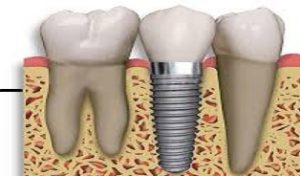
Now going back to the question, I can say that scientific literature indicates a success rate of 88 to 95%, depending on the individual conditions and habits of the patient, overall health and medications taken by the patient. My personal experience indicates a high success rate and durability of teeth replaced with implants, although everybody is a different case and even in ideal situations complications can occur .
Dental Implant problems
Natural teeth and dental implants have a different way to interact with the jaw bone:
- Teeth are not fused to the bone, there is a small gap between natural teeth and the bone, and this gap is fill with elastic fibers, with the function of protection of the tooth when chewing or pressure is put on the tooth.
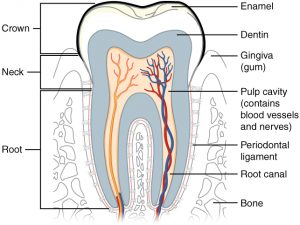
- Dental implants are fused to the bone and this is called osseointegration, even though they can tolerate a lot of pressure during chewing, they are not so good at constant or long term strong lateral forces, because of this if left unattended could lead to bone loss and implant failure.
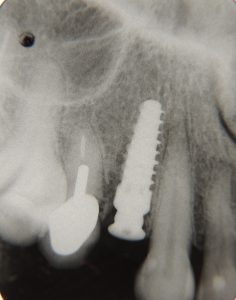
- Peri-implantitis, which could lead to implant failure, it is comparable to gum disease when proper maintenance is not achieved.
Dental Implant procedure steps:
Due to the difference between natural teeth and dental implants discussed previously it is important to start with a preliminary assessment of your unique situation.
1- Inial oral examination:
During this appointment we evaluate the overall health of your teeth, gum, bone, bite relationship and other factors that may affect the success of a future implant. For example if gum disease is present, it has to be treated before the implant is placed. Likewise if you are a bruxer or clench your teeth, we have to plan for the fabrication of a nightguard after the implant is restored therefore achieving protection from lateral forces or bone loss and implant failure may occur.
2- Medical health history:
We may be under the impression that dental work is only related to the mouth, but nothing can be further from the truth, for example if you snore or if you are suffering from sleep apnea, this condition may be weakening and damaging your heart, moreover if you have gum disease, the millions of harmful bacteria under your gum may be traveling to other organs causing heart disease, liver disease, and in some cases chronic diseases such as diabetes.
It is important to know what kind of medications you are taking if any. let’s say you take blood thinners, then we will have to coordinate with your physician to stop or diminish the dose so you don’t bleed during the dental implant placement.
Uncontrolled diabetes has a high risk of implant failure that is why you have to control your diabetes before any implant is placed. As well as in the case of osteoporosis if you are taking bisphophonates, it may be contraindicated the use of implants due to a higher risk of osteonecrosis of the jaw bone, since medications like boniva, Fosamax and similar others alter the physiology of the bone preventing normal healing.
3- Cone bean examination and advantages during treatment planning
Cone bean or CBCT technology, boast image accuracy and give you a 3-D view of the area where the implant will be placed, this tool gives you more information and without the distortion of regular 2-D X-rays and with less radiation than conventional CT. besides the accuracy of the image it allows you to see and measure the bone in 3 dimensions so you can choose the best implant size usually bigger and wider is better, more surface area to dissipate the chewing or masticatory forces.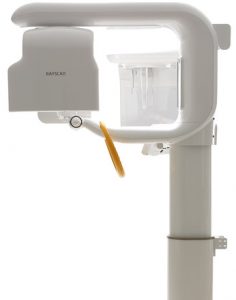
Another advantage is that you can easily locate vital structures like nerves and maxillary sinus thus avoiding those structures at the time of dental implant placement.
Finally cone bean technology have open the doors for cool applications with the use of 3-D printers, where you can print a guide and place the implant exactly where is needed and in less time.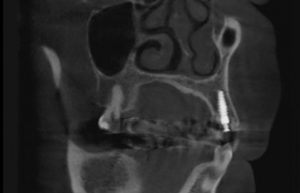
4- Best dental implant
The most common dental implants are called endosteal implants which are the titanium root form, and they come in regular sizes or mini implants, however there are many brands available all share the same characteristics with small modifications. and all commercially available in the USA are FDA approved, and they go thru rigorous test and trials ensuring excellent quality.
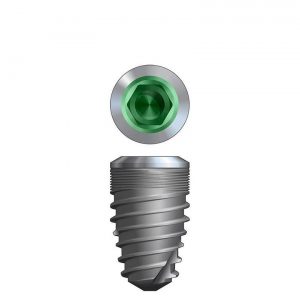
The best implant for you is the one that is going to fit best in your available bone, height, width and diameter, and as we discuss before cone bean technology will give you that data. You can check our previous post to see if you are a good candidate for implants for more information.
5- Implant Placement and restoring function
During this step, the implant is inserted in the jaw bone site , previously selected during the planning phase. After the implant is placed in the bone, whenever possible a temporary tooth will be attached to the implant (tooth the same day), but in most cases a healing abutment is used instead of a temporary tooth to prevent over stressing the implant with chewing forces. After 3-4 months the final tooth (crown), or set of teeth are finally attached to the implant/s using a special screw which is torque to 35 newtons.
6- Maintenance of your implant
The beauty of having implants is the fact that you treat them like your own teeth, brushing and flossing 3 times a day is necessary, electric toothbrush and waterpik waterfloser is recomended for every day use. Our office recommends maintenance appointments every 3-4 months in which you will get a cleaning, and necessary X-rays to monitor the progress of your new teeth, and make sure that everything is going according to plan.
Most implant failure occurs for lack of maintenance or changes in the bite relationship due to change in habits like stress related bruxing, in which case a nightguard or occlusal guard would be necessary as explained before in this post.
Cost of dental Implants
Every case is different and varies according to your needs and wants
Single tooth implant cost
Depending on where the implant will be place may range from $ 1200 to $1500 plus the crown and the abutment. if you need more than one tooth replaced with implants it is best to make a free no obligation consultation for a more accurate estimate.
There are several methods of payment available in our office and payment can be divided in two installments, one at implant placement and in 4 months the payment for the crown. Call us at (954)796-0310 for an appointment or second opinion or for more information.


![Types of Dental Implants[In depth guide]](https://dentistacoralsprings.com/wp-content/uploads/2019/04/woman-front-r-300x200.jpg)